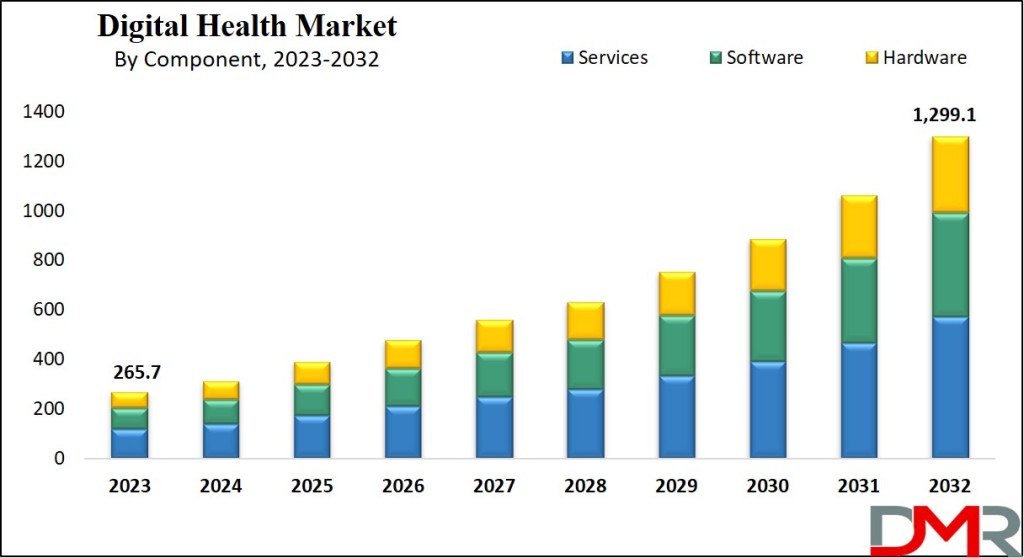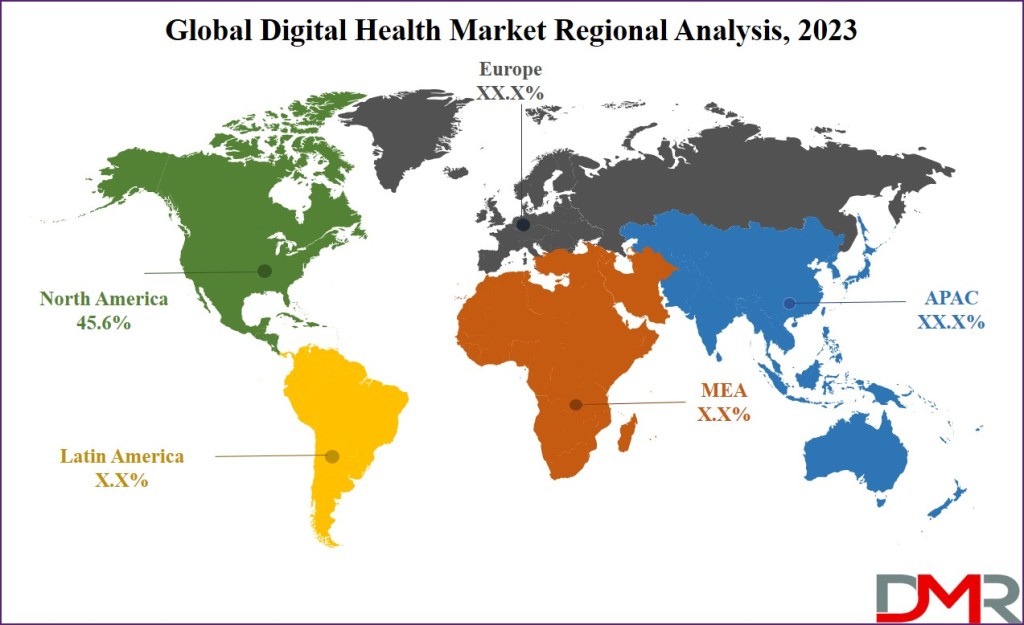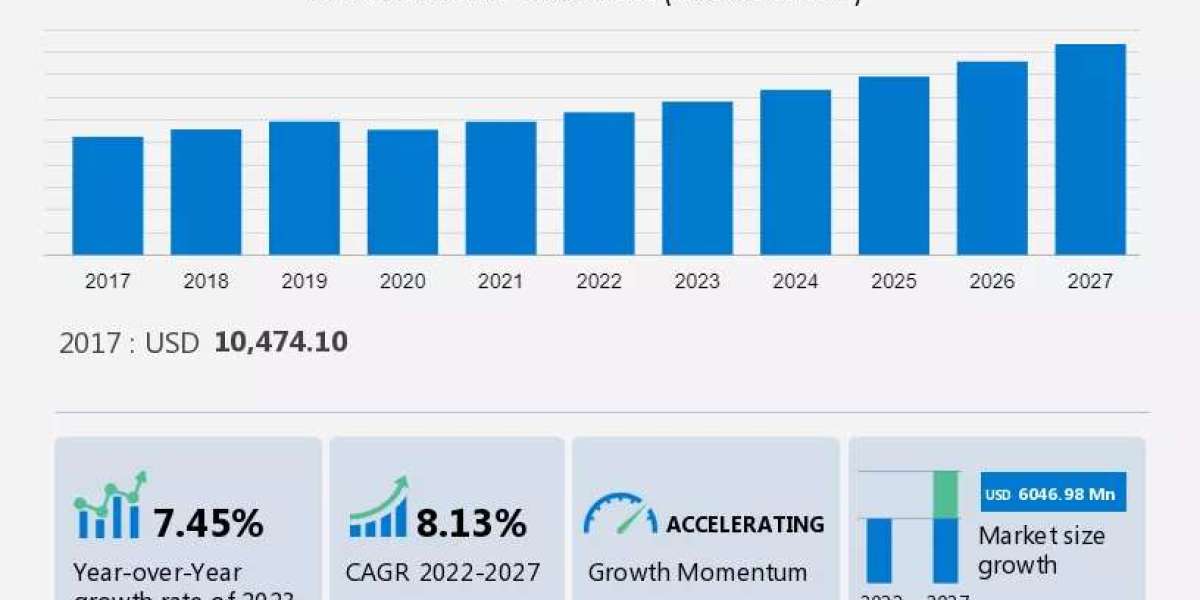Digital Health Market: Revolutionizing Healthcare Through Technology
The Global Digital Health Market is poised for exponential growth, driven by technological advancements and an increasing demand for personalized healthcare solutions. With a projected value of USD 265.7 billion in 2023, this market is expected to soar to USD 1,299.1 billion by 2032 at a remarkable CAGR of 19.3%. The surge in digital health technologies signifies a paradigm shift in the healthcare industry, leveraging innovations to enhance patient care, streamline processes, and ultimately improve health outcomes.
Understanding Digital Health
Digital health encompasses a wide array of technologies, including wearables, smartphones, and electronic health records (EHRs), aimed at transforming traditional healthcare delivery methods. This holistic approach integrates digital platforms with healthcare services, fostering patient engagement and empowering individuals to take control of their health. By leveraging real-time data and analytics, digital health solutions enable healthcare providers to deliver tailored medical interventions, thereby revolutionizing the way healthcare is administered.

Get a Free PDF Sample Copy of This Report@ https://dimensionmarketresearch.com/report/digital-health-market/request-sample/
Key Components of Digital Health
- Services: Dominating the digital health market, services encompass various offerings such as staffing, training, installation, and maintenance. The rising demand for these services underscores the importance of seamless integration and support in the implementation of digital health solutions.
- Software: The software segment is witnessing rapid growth, driven by the adoption of advanced technologies like artificial intelligence (AI) and machine learning. These software solutions enhance healthcare customization and facilitate remote patient analysis, thereby driving market expansion.
- Hardware: While services and software constitute significant segments, hardware also plays a crucial role in the digital health ecosystem. From wearable devices to telehealth equipment, hardware innovations contribute to the seamless integration of digital technologies into healthcare delivery.
Key Takeaways:
- Rapid Growth: The Digital Health Market is experiencing exponential growth, driven by technological advancements, increasing demand for personalized healthcare solutions, and government initiatives promoting healthcare digitization.
- Technological Innovation: Continuous innovation in areas such as AI, machine learning, and telehealth is reshaping the healthcare landscape, enabling more efficient, accessible, and personalized care delivery.
- Patient-Centric Approach: Digital health technologies empower patients to actively participate in managing their health through tools like wearables, mobile health apps, and remote monitoring devices, fostering greater engagement and adherence to treatment plans.
- Market Expansion: The market is witnessing expansion across regions, with North America leading the way due to early adoption of smart healthcare solutions, while the Asia-Pacific region shows significant growth potential driven by increasing adoption of eHealth platforms and government investments in healthcare infrastructure.
- Collaborative Ecosystem: Collaboration among healthcare providers, technology companies, regulators, and other stakeholders is essential for driving innovation, addressing challenges, and ensuring the successful integration of digital health solutions into healthcare systems.
- Focus on Value-Based Care: The shift towards value-based care models incentivizes healthcare providers to prioritize patient outcomes and cost-effectiveness, driving the adoption of digital health technologies that facilitate care coordination, population health management, and preventive care initiatives.
Key Factors
- Technological Advancements: Continuous innovation in AI, IoT, and big data analytics drives the development of advanced digital health solutions.
- Rising Chronic Diseases: Increasing prevalence of chronic conditions fuels demand for remote monitoring and personalized healthcare tools.
- Telehealth Expansion: Growth of telehealth services, accelerated by the COVID-19 pandemic, enhances access to remote healthcare.
- Government Support: Policies and investments by governments worldwide promote the adoption of digital health technologies.
- Cost Efficiency: Digital health solutions optimize workflows and reduce healthcare costs, addressing resource constraints.
- Data Security: Concerns over data security and privacy necessitate robust cybersecurity measures and regulatory compliance.
- Consumer Demand: Patients seek convenient and transparent healthcare services, driving the consumerization of healthcare.
- Collaboration: Partnerships among healthcare providers, technology companies, and regulators drive innovation and interoperability.
- Aging Population: The global aging population increases demand for healthcare solutions tailored to older adults' needs.
- Patient-Centric Care: Emphasis on patient engagement and satisfaction fosters the development of patient-centric digital health tools.
Targeted Audience :
- Healthcare Providers: This includes physicians, nurses, allied health professionals, and administrators who deliver patient care. They are key users of digital health technologies and rely on them to improve clinical workflows, enhance patient outcomes, and streamline healthcare delivery processes.
- Healthcare Organizations: Hospitals, clinics, medical practices, and healthcare facilities are essential stakeholders in the adoption of digital health solutions. These organizations implement and integrate digital health technologies into their systems to improve operational efficiency, patient engagement, and compliance with regulatory requirements.
- Healthcare IT Professionals: IT professionals specializing in healthcare IT play a crucial role in the implementation and management of digital health systems. They are responsible for deploying electronic health records (EHRs), telehealth platforms, and other digital health solutions, as well as ensuring their security, interoperability, and compliance with industry standards.
- Patients and Caregivers: Patients and their caregivers are the end-users of digital health technologies. They use mobile health apps, wearable devices, and telehealth platforms to monitor health metrics, communicate with healthcare providers, and manage chronic conditions remotely. Caregivers, including family members and professional caregivers, also play a role in supporting patients' use of digital health solutions.
- Healthcare Payers and Insurers: Health insurance companies, government agencies, and other healthcare payers are important stakeholders in the digital health ecosystem. They evaluate the cost-effectiveness and impact of digital health technologies on healthcare outcomes and expenditures, and may incentivize their adoption through reimbursement policies and value-based payment models.
Regional Analysis
North America
As the dominant market leader, North America captures a significant share of the digital health market revenue. Early adoption of smart healthcare solutions and favorable regulatory frameworks have propelled the region's growth. Factors such as the proliferation of smartphones, advancements in network coverage, and the prevalence of chronic diseases contribute to North America's market dominance.

Asia-Pacific
The Asia-Pacific region is poised for rapid growth, driven by increasing adoption of eHealth platforms and government investments in healthcare infrastructure. Initiatives promoting remote patient monitoring and telehealth services are expected to propel market growth in this region. Active participation of major market players further augments healthcare accessibility and services in the Asia-Pacific region.
Market Dynamics
The global adoption of digital health technologies is propelled by the increasing demand for personalized healthcare solutions tailored to individual patients. The emphasis on personalized healthcare aims to create treatment plans that consider various factors such as genetics, lifestyle, and environmental influences. Digital health tools like electronic health records (EHRs) and machine learning algorithms empower healthcare providers with actionable insights, facilitating early intervention and preventive care.
However, challenges such as limited access to smartphones and poor internet connectivity in remote areas pose obstacles to the widespread adoption of digital health technologies. Addressing these challenges requires concerted efforts to improve infrastructure and enhance accessibility, ensuring that digital health solutions reach underserved populations.
Research Scope and Analysis
By Component
The digital health market is segmented into services, software, and hardware, with services commanding the largest share of revenue. This growth is fueled by the increasing demand for implementation and support services essential for deploying digital health solutions effectively. Furthermore, the rapid adoption of software solutions, coupled with advancements in AI and machine learning, is driving significant growth in the software segment.
By Technology
Telehealthcare emerges as a frontrunner in the digital health landscape, with telehealth services witnessing substantial growth. The proliferation of telehealth platforms facilitates accurate health monitoring and real-time population management, contributing to enhanced healthcare delivery. Additionally, remote patient monitoring is gaining traction, particularly for chronic conditions, fueled by technological advancements and government initiatives promoting healthcare digitization.
Competitive Landscape
The digital health market is characterized by intense competition, with established leaders and new entrants vying for market share. Major companies are investing in telehealth technology to cater to the growing demand for digital healthcare solutions. Initiatives such as the establishment of AdvaMed Digital Health Tech underscore the industry's commitment to driving innovation and advocating for digital transformation in healthcare.
Key Players
- Cisco System Inc
- AT&T Inc
- iHealth Lab Inc
- Cerner Corp
- McKesson Corp
- Athenahealth Inc
- EClinicalWorks
- BioTelemetry Inc
- Allscripts Healthcare LLC
- GE Healthcare
Recent Development (2023):
In 2023, the Digital Health Market witnessed a significant milestone with the introduction of advanced remote patient monitoring systems. These systems leverage cutting-edge technology such as wearable devices, sensors, and AI algorithms to enable real-time monitoring of patients' vital signs, health metrics, and symptoms from the comfort of their homes. This development has revolutionized healthcare delivery by facilitating proactive and personalized care, reducing hospital readmissions, and improving patient outcomes.
Frequently Asked Questions (FAQs)
1. What is digital health, and how does it differ from traditional healthcare?
Digital health encompasses technologies like wearables, smartphones, and electronic health records, aiming to enhance patient engagement and healthcare delivery. Unlike traditional healthcare, digital health leverages real-time data and analytics to personalize medical treatment and improve health outcomes.
2. What are the key drivers fueling the growth of the digital health market?
The growth of the digital health market is driven by factors such as the increasing demand for personalized healthcare solutions, advancements in technology like AI and machine learning, and government initiatives promoting healthcare digitization. Additionally, the rising prevalence of chronic diseases contributes to market expansion.
3. How does telehealth contribute to the digital health ecosystem?
Telehealth services enable remote healthcare delivery, facilitating accurate health monitoring and real-time population management. The constant enhancement of telehealth hardware and software components drives service expansion, offering patients access to critical healthcare information remotely.
4. Which regions are poised for significant growth in the digital health market?
North America stands out as a dominant market leader, driven by early adoption of smart healthcare solutions and favorable regulatory frameworks. The Asia-Pacific region is also expected to witness rapid growth, fueled by increasing adoption of eHealth platforms and government investments in healthcare infrastructure.
5. How do digital health technologies address challenges in healthcare delivery?
Digital health technologies empower healthcare providers with actionable insights, facilitating early intervention and preventive care. By leveraging real-time data and analytics, these technologies enable personalized treatment plans tailored to individual patients, ultimately improving healthcare efficiency and patient outcomes.
Conclusion
The Digital Health Market represents a transformative force in the healthcare industry, harnessing technology to revolutionize patient care and healthcare delivery. With a projected market value exceeding USD 1.2 trillion by 2032, the future of digital health is ripe with opportunities for innovation and growth. As stakeholders continue to invest in digital healthcare solutions, the landscape of healthcare is poised for profound and lasting change, ushering in an era of personalized medicine and improved health outcomes.








